UPDATE 1-Iowa official slams viral claim of suspicious voter registration activity as false

- Country:
- United States
A viral claim by a conservative activist group that voter registration numbers in Iowa are suspiciously large ahead of the first U.S. presidential nominating contest on Monday is false, a senior state government official said, and called on the group to end its "misinformation campaign." Iowa's Secretary of State Paul Pate, a Republican, said the claim by Washington D.C.-based group Judicial Watch that total registration numbers for caucuses in eight Iowa counties were larger than the eligible voter population had been disproven by official data.
"It's unfortunate this organization continues to put out inaccurate data regarding voter registration, and it's especially disconcerting they chose the day of the Iowa Caucus to do this," Pate said in a news release posted on Twitter, criticizing their data as flawed. "They should stop this misinformation campaign immediately."
Democrats start their hunt for a challenger to President Donald Trump in the November general election at the Iowa caucuses. Judicial Watch's Facebook post on Monday garnered 10,000 shares and, on Twitter, a tweet on Sunday from conservative student group Turning Point USA's president Charlie Kirk sharing the same information has been retweeted more than 40,000 times.
Judicial Watch President Tom Fitton called Pate's denial of its claim "shameful." "It is shameful that the secretary state of Iowa would mislead Iowans and Americans about the accuracy of the state’s registration rolls," he said in a tweet.
Turning Point did not immediately respond to Reuters requests for comment. Social media companies are under pressure to police misinformation ahead of the November 2020 election after U.S. intelligence officials said that Russia used the sites as part of a cyber-influence campaign aimed at interfering in the 2016 presidential election - a claim that Moscow has denied.
"We're seeing a recent uptick in activity spreading false info about widespread voter fraud," David Becker, the executive director of the Center for Election Innovation & Research, said on Twitter. "Again, the data on this is clear and conclusive - voter fraud is extremely rare." A Facebook spokesman told Reuters that Judicial Watch's post did not violate its voter suppression policies because it did not make misrepresentations about how to vote or whether a vote would be counted.
The company later said that its third-party fact-checking partners had determined the post to be false, meaning a "false information" label would be placed on it whenever it is shared on Facebook. A Twitter spokesman also said tweets from Kirk and Judicial Watch did not violate its election integrity policy.
Twitter's policy says that users are not allowed to post or share "false or misleading information intended to intimidate or dissuade voters from participating in an election." Last week the company announced it was turning on a tool to enable people to report misleading information.
(This story has not been edited by Devdiscourse staff and is auto-generated from a syndicated feed.)
- READ MORE ON:
- Iowa
- Democrats
- Washington DC
- Republican
- Donald Trump
- Turning Point USA
- Russia
ALSO READ
Trump''s immigration rhetoric makes inroads with some Democrats. That could be a concern for Biden
US Domestic News Roundup: Kamala Harris pushes the envelope as Biden struggles with some Democrats; Texas federal judge blocks updated fair lending rules and more
California Democrats urge Biden not to scrap chips R&D funding
Donald Trump wins the Republican presidential primary in Rhode Island, reports AP.
Donald Trump wins the Republican presidential primary in New York, reports AP.










